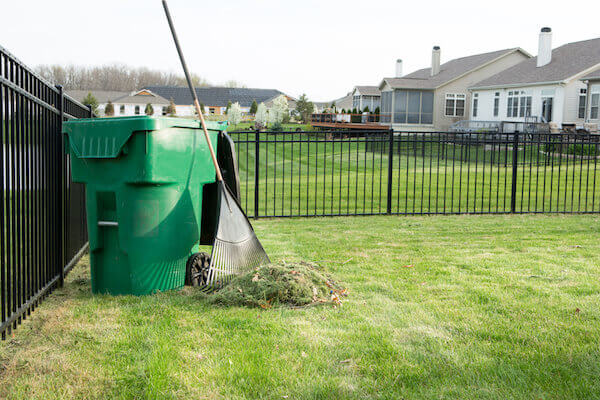
How Recycling Lawn Waste Will Improve Your Landscape
Landscape maintenance activities such as mowing, pruning, raking all generate yard waste that can return valuable nutrients to the soil if recycled. Try recycling grass clippings, leaves, and yard trimmings rather than throwing them in the trash. By recycling yard debris, we gain free mulch and return valuable nutrients to the soil. Here is the latest information regarding recycling, or composting and keeping your lawn happy and healthy.
Composting is the biological decomposition of organic waste such as food or plant material by bacteria, fungi, worms and other organisms under controlled aerobic (occurring in the presence of oxygen) conditions. The end result of composting is an accumulation of partially decayed organic matter called humus. Composting with worms, which is also known as vermiculture, results in nutrient-loaded worm castings. Composting is a great American tradition that people are rediscovering. Turn plant and kitchen scraps into rich soil for your indoor and outdoor plants. Compost piles are very easy and inexpensive to establish, and they can produce high-quality organic fertilizer for your yard and garden.
Yard waste is such materials as leaves, grass clippings, brush, and prunings. Some states, including Florida, have banned yard waste from landfills. Leaves and grass clippings can be used as mulch in your garden or landscape. Yard waste that will be picked up should be bundled or bagged.
Here are some steps to make composting work for you:
- Choose the right composting method for you: bin composting (simply throw in organic materials as they become available around your home and yard) and worm composting (a popular way to compost small amounts of food and paper wastes
- Choose the right location for your compost bin: consider how you will get the raw materials to the pile, and how the finished compost will be moved to the area it will be used.
- Decide what to compost: To build a compost pile, simply alternate layers of browns and greens. Greens include vegetable and food scraps, fresh grass clippings and yard waste, coffee grounds, tea bags, and egg shells. Browns include dried leaves, grass, mulch, or hay, cardboard rolls, sawdust, lint, shredded newspaper, fireplace ashes, hair or fur, clean paper, and wool or cotton rags. You should avoid egg yolks, meat, oils, grease, pesticides, and pet waste.
- The compost pile should be periodically mixed to incorporate oxygen. Regularly check the internal temperature and turn over the mixture when it reaches 140°F.The compost pile should be built in layers 3 – 4 inches deep. Composting still happens if the pile is not turned, but the materials break down slowly.
- Once the composting process is complete, the result is a dark, nutrient-rich humus that has many uses.
Managing a Compost Pile
A new pile of green and brown materials will heat up rapidly. This is a reflection of the microbial activity. After 4-7 days, it will begin to cool and should be turned at this time to mix the materials and allow the pile to heat again. A hot pile will often produce steam, but this is nothing to worry about. Compost can be produced fairly rapidly (about six weeks) if the pile is occasionally turned and watered (if dry). Turning also shifts material from the outer (cooler) part of the pile to the warmer center. It may be necessary to add more water during the composting period if the pile appears dry. Materials added to a compost pile or unit which is not turned or watered will still decompose. It will just take much longer.
If you are interested in monitoring the temperature of the pile, use a long-stemmed compost thermometer that reads to 160° F or higher. The most effective range for composting seems to be 122°F – 131°F. Higher temperatures of 131°F – 140°F may be desirable to destroy weed seeds or plant pathogens, but it is difficult to maintain a pile at that temperature. At temperatures above 149°F many of the organisms involved in composting become inactive or die. If the pile becomes too hot, decrease the intervals between turnings.
From start to finish, a compost pile is wonderful for the environment, for your yard and beyond. Keeping your soil healthy will help you maintaining a Florida-Friendly lawn and a Florida-Friendly lifestyle!